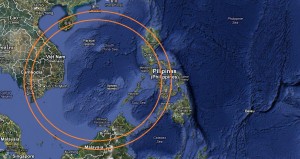US lawmakers say China bullying neighbors
 WASHINGTON—US lawmakers on Wednesday accused China of bullying its neighbors to press territorial claims in Asian seas but also raised questions about America’s capacity to police the Asia-Pacific region.
WASHINGTON—US lawmakers on Wednesday accused China of bullying its neighbors to press territorial claims in Asian seas but also raised questions about America’s capacity to police the Asia-Pacific region.
Three congressional panels this week are scrutinizing what they consider to be the security threat posed by China and its human rights record.
With the US presidential election two months away, Republican contender Mitt Romney has accused Barack Obama of being soft on China, particularly on trade issues, as he has tried to cultivate ties with the emerging superpower.
But criticism dished out by members of the House foreign relations committee on Wednesday was directed squarely at Beijing.
Schoolyard bully
The House committee’s Republican chair, Ileana Ros-Lehtinen, dubbed China a “schoolyard bully toward its maritime neighbors” that aspired to be the dominant power in Asia, controlling vital sea-lanes that could be used to choke off commerce and oil shipments.
She said the United States would stand by its allies, the Philippines and Japan.
“Other global crises must not distract from our vital national interests in the South China Sea and the western Pacific,” she told a hearing addressing the issue.
Top Democrat Howard Berman said the Obama administration had repeatedly made clear to Beijing that the United States would not allow China to assert hegemony over the region.
He said the United States must continue to press China to resolve its claims peacefully.
Overlapping claims
China and five of its neighbors, including the Philippines and Vietnam, have overlapping claims to several small but potentially energy-rich areas of the East Sea and the West Philippine Sea that have become an increasing focus of bickering and confrontation.
In July, China upped the ante when it created a city and military garrison on Woody Island, in the Paracel chain in the East Sea, to strengthen its control over disputed islands.
The United States criticized that as undermining efforts to manage and resolve disputes through diplomacy. That angered China, which says it has no aggressive intent.
Peace and stability
The United States, which remains the world’s predominant military power, says it does not take a position on the competing territorial claims, but has a national security interest in the maintenance of peace and stability in the region.
On Tuesday it urged “cooler heads to prevail” in a separate island dispute between Japan and China in the East China Sea.
Republican Rep. Mike Kelly questioned the ability of an indebted United States to sustain its military presence across the world, and suggested China was now “the toughest guy in the neighborhood” that would call the shots on policy there.
“At some point we better wake up and smell the coffee,” Kelly said. “We have a diminished influence because we really don’t have the ability at times to do what we say we are going to do.”
Security burden
Democrat Rep. Brad Sherman said US allies needed to bear more of the security burden, as during the Cold War against the Soviet Union.
“Those nations in the Asia-Pacific region, particularly those that have concerns with China’s expansionary claims, ought to be devoting a reasonable portion of GDP to their own naval defense,” he said.
On Thursday, the House intelligence committee will question executives of two major Chinese technology companies as it probes allegations that the firms’ involvement in the US market could pose a national security risk. AP














